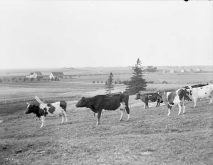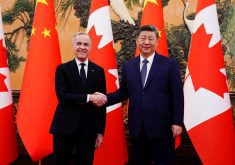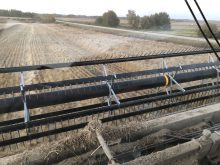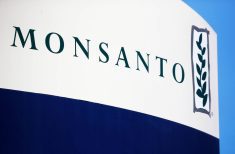Farm organizations have been quick to bring forward some lengthy election wish lists for politicians to consider during Canada’s sprint to the April 28 vote.
It’s no surprise that tariffs top those lists. Farm groups are calling on the federal government to do whatever it takes to maintain tariff-free access to the United States and Chinese markets for livestock and grains.
Even though Donald Trump gave Canada a temporary pass on goods that are compliant with the Canada-U.S.-Mexico Agreement on April 2 — for now — the uncertainty continues given his penchant for erratic changes in direction.
Read Also

Agriculture, including the pork sector, has monsters to slay in 2026
Tariffs, trade protectionism and disruption; Uncertainty is weighing against what should be positive signals for Manitoba’s pork sector.
“Tariffs, and the potential for tariffs, from the two key markets of the U.S. and China are the largest threats facing our industry today,” said Cam Dahl, general manager of the Manitoba Pork Council. “If trade restrictions last without mitigation, jobs and income in every part of Manitoba will be impacted.”
Manitoba exports approximately 90 per cent of the eight million pigs producers raise annually, either live or after processing. China has slapped tariffs on Canadian pork in retaliation for the government’s decision to place 100 per cent tariffs on imported Chinese-made electric vehicles.
The canola sector is already facing a double whammy, after canola-based biofuel was declared ineligible for the U.S. Clean Fuels Production Credit program in January and China announced tariffs on canola oil and meal imports from Canada.
Notably, seed sales, which are the biggest canola export to China by far, haven’t been tariffed, at least not yet.
However, combined, the U.S. and China account for more than half of Canadian grain and oilseed exports.
“These tariffs will push down the prices farmers receive for our crops, just as input costs and government regulations are already eating into our bottom line,” said Tara Sawyer, chair of the Grain Growers of Canada. “When farmers see prices drop, it impacts every part of their operation — from how much they can invest in next year’s crop to their ability to support their families. We’re being forced to pay the price for political decisions beyond our control.”
Even though Prime Minister Mark Carney suspended the consumer portion of the carbon tax, farmers continue to lobby for the industrial tax to be eliminated as well, fearing its cost will still be passed back to the farm.
Another wish high on their list was granted before the writ was dropped. The federal government backed off on plans to increase the amount of capital gains subject to taxation.
Farmers want more railway competition through extended interswitching, which allows shippers on one line to transfer their goods to another railway where two meet. They want more transparency in grain markets, better contract provisions, more rural vets, better farm support programs, streamlined regulations, more money invested in research — the list goes on.
There’s no denying these are important issues for agriculture. The arguments these groups are making are, for the most part, well-reasoned and articulate. But they also risk being lost in the electioneering noise around building more houses and affordablity. They also miss the mark in what is billed as the most important election of our times.
Kim Campbell, who briefly served as prime minister in 1993, before the Progressive Conservatives lost to the Liberals under Jean Chrétien, was skewered for being a little too honest when she told a reporter, “Elections are no time to discuss serious issues.”
She had a point. Elections are about winning over hearts and minds. The granular details are what comes later.
This campaign is a rare opportunity for Canada’s agricultural sector to make its way onto the national agenda in a way that’s been hard to achieve in the past when food was cheap and supply chains were humming.
Concepts the electorate had the luxury of taking for granted before — such as national security — have taken on new significance this time around.
Food security is fundamental to national security, which makes supporting this country’s agriculture something every Canadian can agree on as a priority.
Farmers must walk a fine line. It’s one thing to remind voters and candidates of agriculture’s importance to the country’s security. It’s fair game to outline how farmers feel threatened by circumstances they cannot control and that the current circumstances place their livelihoods at risk.
However, it is counterproductive to suggest that they are being sacrificed for the sake of others or that farmers aren’t getting their fair share of government largesse.
For example, the decision to impose tariffs on Chinese electric vehicles to protect Canada’s fledgling electric vehicle industry, while staying aligned with American interests is questionable on several fronts, especially since the U.S. has walked away from its alliance with Canada. But it is disingenuous to suggest it was done with the intention of sacrificing Canadian canola farmers. Even if that suggestion were true, it is not an effective strategy for getting the rest of Canada on the side of the grower.
Both sectors contribute to Canada’s employment and economic wealth. Both sectors may need taxpayers to help them ride through these unexpected trade disruptions.
Whether it’s Eastern Canada versus Western Canada or canola farmers versus unionized autoworkers, there is little to gain and much to lose by arguing that one is more important than another. Farmers need non-farmers in their corner now more than ever if they’re going to be heard.
















